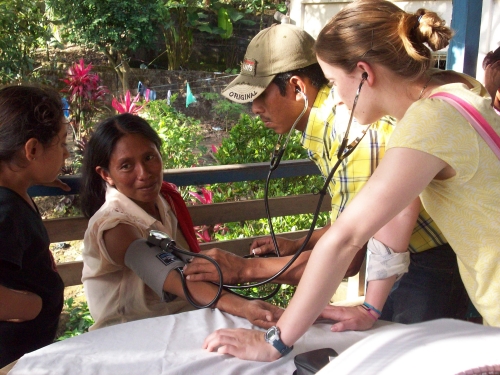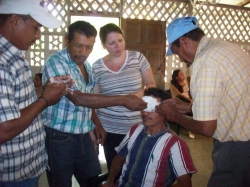Promoting health in Nicaragua through education and technology

Senior Cate Cappazolla teaches a community health worker in Waslala proper technique for assessing blood pressure.
Spring break this year for 26 nursing and engineering faculty and students did not take place on the beaches of the Caribbean, but rather in the mountains and rural communities of Waslala, Nicaragua in the North Atlantic Autonomous region of Nicaragua.
The nursing students traveled there as part of their senior level health promotion practicum. Dr. Ruth McDermott-Levy, Dr. Bette Mariani, and Professor Kimberly Connolly worked with the students in collaboration with the Ministry of Health in Waslala to teach community health workers (CHWs) about common health problems and learn practical skills, such as taking blood pressures. The nursing students provided interactive educational sessions for the CHWs on topics such as, postpartum maternal health care, infectious diseases, eye emergencies, and blood pressure management.
In addition, their work supported the ongoing TeleHealth project, that began in 2010. The TeleHealth program enables the CHWs to have real-time communication with a healthcare provider. This will enable the CHWs to have professional support to meet the health needs of the members of their remote rural communities.

Megan Copel, a senior nursing student, teaches eye injury care to CHWs.
The nursing students researched the safety and health topics and prepared the teaching modules which were translated into Spanish for both the CHWs and members of rural communities. Basic health information is critical in this area of Nicaragua where access to healthcare may be hours to days away. The nursing group travels to Waslala with College of Engineering students and faculty who in parallel work on safe and accessible water for Waslala residents, as well as the technology to support the TeleHealth project. The collaboration results in meeting the basic needs of the people of Waslala.
Additionally, the nursing students provided a practical hands-on experience mentoring the CHWs on taking vital signs in a Home for the Elderly and the Maternal Home, where women go to safely await the birth of their child. This gave the students the opportunity to work one on one with the CHWs, and to validate the skills of the CHWs. The experience enhances the nursing students’ global perspective of health and health care.

